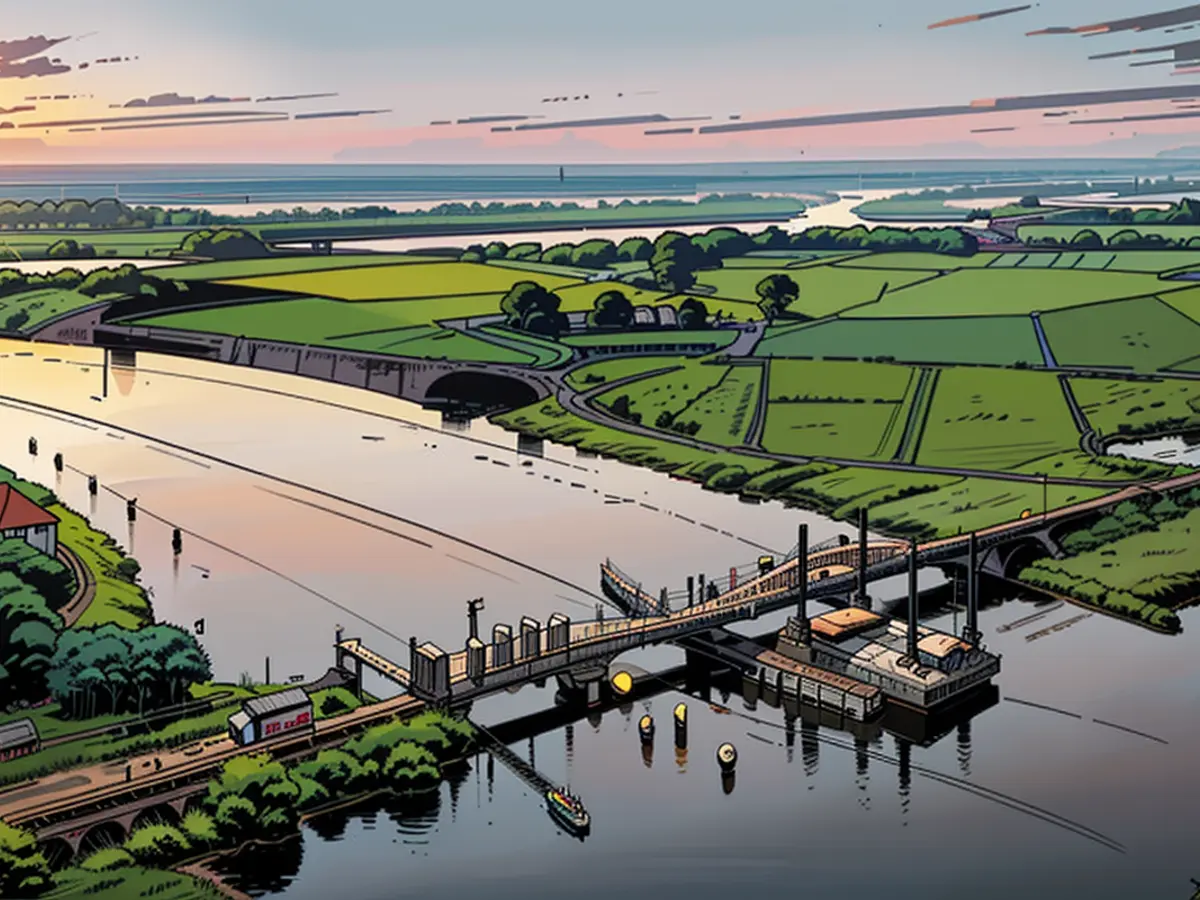Wesermarsch District - Another accident at Huntebridge had serious consequences
After another shipping accident at the railroad bridge in Elsfleth, in the Wesermarsch district, the shipping traffic on the Hunte river has been halted in both directions. A spokesperson for the Water Police made this known. Trains cannot cross the bridge for the time being either. The closure has significant economic consequences for the ports on the left bank of the Weser, which depend on the connection.
Investigations against the ship's captain
The cause of the accident is, according to initial investigations by the Water Police, an error by the ship's captain. It was revealed in interrogations that this man had misjudged the clearance height. The Water Police are now investigating due to the allegation of endangering railway and shipping traffic. A technical defect on the inland tanker ship can be ruled out, it was stated.
The inland vessel collided with the railroad bridge in the afternoon on a Tuesday. The bridge house of the tanker was almost completely torn off and the bridge was damaged. The ship's captain and one other crew member were taken to the hospital with minor injuries. The railway traffic over the bridge was stopped for an indefinite period, a bus shuttle was set up.
The extent of the damage was initially unclear. Whether and when trains could cross the bridge again had to be checked, said a railway spokeswoman. The decision on this would not be made before at the earliest on Wednesday, she said.
Second accident within a few months
The structure in question is a makeshift bridge, as a barge had collided with the regular railroad bridge in February. The 110-meter-long vessel collided with the structure and severely damaged it. The rails were bent, the overhead power lines were damaged, and the understructure was shifted. Human error was also the cause of the accident in February. According to the Water Police, the previous ship's captain is accused of endangering railway and shipping traffic. A swift indictment is expected, it was stated.
The now damaged makeshift bridge had been in operation since the end of April. After weeks of standstill, trains between Berne and Elsfleth were able to run again, and the ports in Nordenham and Brake were reachable by rail.
However, for Oldenburg, the makeshift bridge was not a solution, as the harbor has been cut off since the first accident in February. The construction of a new bridge could take years - and the damage could quickly reach a two-digit million euro sum, it was feared from Oldenburg.
Inland vessels must pay attention to water levels
The provisional bridge, according to the Lower Saxony Transport Ministry, was 30 centimeters lower than the previous bridge and could not be opened for ships. For seagoing vessels, the height was not sufficient, they could not pass the river at that point. Inland vessels could only pass under the bridge if the water level was low enough.
According to the Water Police, the water level indicators on the Hunte are visible. In addition, the water level indicators are transmitted via radio. "The ship captains are obliged to listen to these messages," the spokesperson said.
Significant consequences for the ports' supplies
With the latest accident, the Huntes in Elsfleth are again closed for shipping traffic, making important Lower Saxony ports inaccessible. "It's a real pinch," said a spokesperson for the Water Police. "There's a significant restriction of harbor supplies and economic sites." The failure of this bridge reportedly causes significant economic damage.
For the ports to the left of the Weser, the suspension of rail transport is also problematic: For example, in the Sea Port Brake, around 30 percent of the turnover is handled by rail. Already due to the first accident, damages of around one million Euros were incurred there, according to estimates by the state-owned harbor infrastructure company Niedersachsen Ports. The makeshift bridge - which is now also damaged.
- Further investigations are needed to determine the exact extent of the damage to the railroad bridge following the accident involving an inland ship.
- The Water Police in Lower Saxony are currently conducting a hunt for any potential safety issues in the ship traffic on the Weser due to the recent incidents.
- The captain of the ship involved in the accident at the Elsfleth shipwreck site is now under investigation for potential neglect of safety protocols in shipping traffic.
- The tanker ship, which collided with the makeshift bridge in Elsfleth, had a brake system that was found to be functioning correctly, according to the Water Police's findings.
- The anonymous tip-off about the alleged misconduct of the ship's captain during the accident in Elsfleth is being treated seriously by the Water Police and will be thoroughly investigated.
- The Oldenburg District Water Police have reported an increase in shipping accidents in the Weser area, with the latest accident serving as a stark reminder of the need for improved safety measures in ship traffic.
- The coding used by the Water Police to indicate clearance heights for ships in Lower Saxony has come under scrutiny in light of the recent accidents, with calls for greater clarity and standardization in these guidelines.
- In the aftermath of the accidents at the railroad bridge in Elsfleth, the Weser Maritime Police are offering a reward to anyone with information leading to the identification and prosecution of any negligent or reckless ship captains.
- The Elsfleth harbor, which has been a hub for inland ship traffic and railway connections, is now facing significant economic challenges due to the repeated disruptions caused by shipping accidents in the Weser area.








